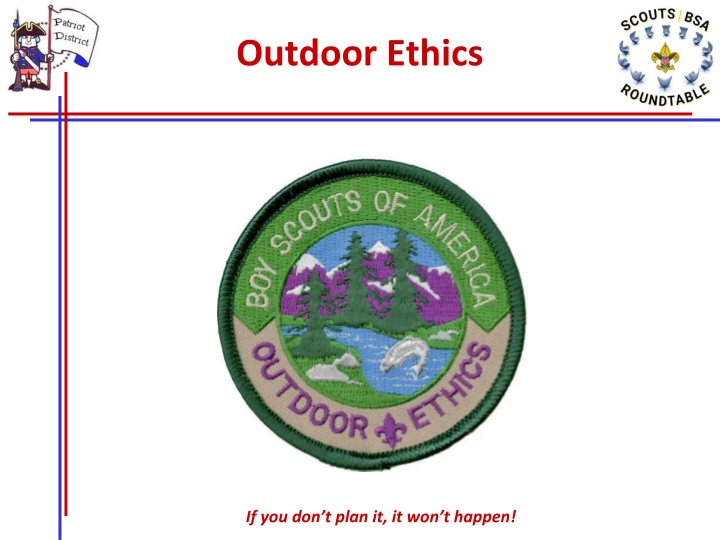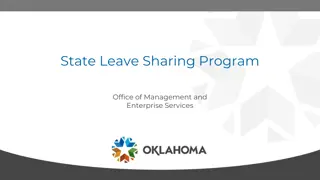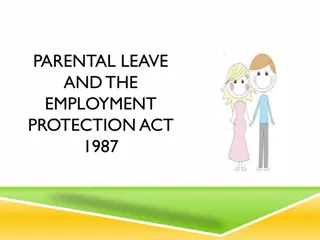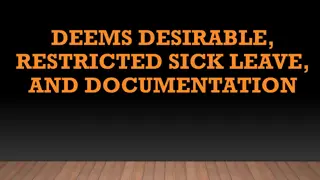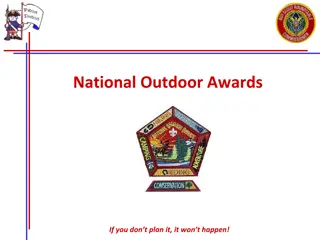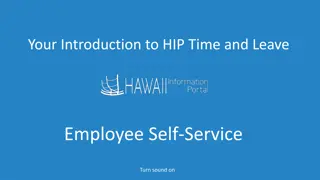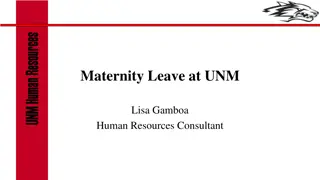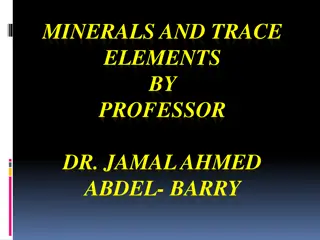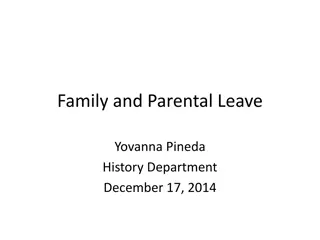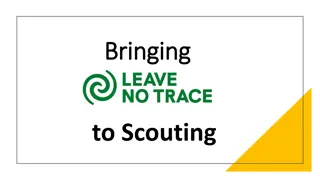Importance of Outdoor Ethics and Leave No Trace Principles
Outdoor ethics play a crucial role in preserving natural areas for future generations. The increase in visitors to wilderness areas highlights the need for responsible behavior. Integrating Leave No Trace principles into programs like BSA emphasizes the value of conservation and respect for the outdoors. The Outdoor Code and principles of Leave No Trace and Tread Lightly guide individuals on how to minimize their impact when enjoying the outdoors.
Download Presentation

Please find below an Image/Link to download the presentation.
The content on the website is provided AS IS for your information and personal use only. It may not be sold, licensed, or shared on other websites without obtaining consent from the author.If you encounter any issues during the download, it is possible that the publisher has removed the file from their server.
You are allowed to download the files provided on this website for personal or commercial use, subject to the condition that they are used lawfully. All files are the property of their respective owners.
The content on the website is provided AS IS for your information and personal use only. It may not be sold, licensed, or shared on other websites without obtaining consent from the author.
E N D
Presentation Transcript
Outdoor Ethics If you don t plan it, it won t happen!
Outdoor Ethics- Why? Today, use of designated wilderness areas has increased from 4 million people in 1964, to 7 million people in 1974, to 15 million in 1984, 21 million in 1994, and nearly 30 million expected users in 2000. That s a 750 percent increase in 30 years! As cities grow and populations encroach upon wildlands and recreation areas, we must do more than just pick up the litter and extinguish campfires. We must learn how to maintain the integrity and character of the outdoors for all living things. Leave No Trace is not simply a program for visiting the backcountry, it is an attitude and a way of life. Learning about Leave No Trace begins with your unit. The knowledge and concepts enabling visitors to leave no trace are easily taught both before and during outings. This helps you teach others the value of natural areas and the methods we can use to help protect and conserve these areas for future generations. If you don t plan it, it won t happen!
Outdoor Ethics Now deeply integrated to BSA program Not just for youth! Scouters encouraged to get training too. NYLT, NAYLE, IOLS, Wood Badge, BCOLS Three Components Outdoor Code Principles of Leave No Trace Principles of Tread Lightly! Now incorporated into Scout, Tenderfoot, 2nd Class, and 1st Class requirements If you don t plan it, it won t happen!
The Outdoor Code As an American, I will do my best to Be clean in my outdoor manners. Be careful with fire. Be considerate in the outdoors. Be conservation minded. If you don t plan it, it won t happen!
Principles of LNT Plan ahead and prepare. Travel and camp on durable surfaces. Dispose of waste properly. Leave what you find. Minimize campfire impacts. Respect wildlife. Be considerate of other visitors. If you don t plan it, it won t happen!
Principles of Tread Lightly! Travel responsibly Respect the rights of others Educate yourself Avoid sensitive areas Do your part If you don t plan it, it won t happen!
Tread Lightly! Travel responsibly e.g. designated roads, designated water ways, Respect the rights of others e.g. property rights, camp sites, right of way Educate yourself e.g. travel maps, rules, skill development Avoid sensitive areas e.g. meadows, wetlands, wildlife habitats Do your part e.g. set example, LNT, better than before If you don t plan it, it won t happen!
Outdoor Ethics OUTDOOR ETHICS RELATED RANK REQUIREMENTS: TENDERFOOT 1C. Tell how you practiced the Outdoor Code on a campout or outing. SECOND CLASS 1B. Explain the principles of Leave No Trace and tell how you practiced them on a campout or outing. This outing must be different from the one used for Tenderfoot requirement 1c. FIRST CLASS 1B. Explain each of the principles of Tread Lightly! and tell how you practiced them on a campout or outing. This outing must be different from the ones used for Tenderfoot requirement 1c and Second Class requirement 1b. If you don t plan it, it won t happen!
New Position Outdoor Ethics Guide The outdoor ethics guide is a troop position of responsibility that counts for the leadership requirement for Star, Life, and Eagle ranks. It was instituted in the 13th edition of the Scouts BSA Handbook. This replaces the role of the Leave No Trace trainer, which was also a Star and Life leadership position. Trains others: Explains to Scouts the relevant requirements for the Tenderfoot, Second Class, and First Class ranks. Demonstrates how to practice the Outdoor Code, and the Leave No Trace and Tread Lightly! principles to meet advancement requirements. Provides leadership: Helps the troop plan and conduct an outdoor program that effectively practices outdoor ethics. Mentors den chiefs in the Outdoor Code and practicing Leave No Trace Principles for Kids. Helps Life Scouts understand, plan, and carry out activities or projects meeting conservation service hour requirements. Supports recognition: Encourages Scouts and leaders to complete the Outdoor Ethics Awareness and Action awards. Completes self-evaluation: Uses tools to evaluate how well they carried out the responsibilities of outdoor ethics guide. If you don t plan it, it won t happen!
Outdoor Ethics Awareness Award Scouts interested in learning more about outdoor ethics and Leave No Trace should begin by exploring the Outdoor Ethics Awareness Award. 1.Recite from memory and explain the meaning of the Outdoor Code. 2.Watch the National Park Service Leave No Trace video. 3.Complete the Leave No Trace online course 4.Complete the Tread Lightly! online course 5.Participate in an outdoor ethics course, workshop, or training activity facilitated by a person who has completed the BSA outdoor ethics orientation course or is a BSA outdoor ethics trainer or master. If you don t plan it, it won t happen!
Outdoor Ethics Action Award The Outdoor Ethics Action Award challenges Scouts and Scouters to take affirmative steps to improve their outdoor skills. Tread Lightly! principles. All members of the troop participating in the outing should use the outdoor ethics and the specific skills needed to minimize impacts from their use of the outdoors. Follow the Outdoor Code, Leave No Trace, and Tread Lightly! principles on three outings. Write a paragraph on each outing explaining how you followed the Outdoor Code, Leave No Trace, and Tread Lightly! Share it with your unit leader or an individual who has completed the BSA outdoor ethics orientation course. On a troop outing, help your troop on a service activity that addresses recreational impacts related to the type of outing. The project should be approved in advance by the landowner or land manager and lead to permanent or long-term improvements. Participate in a report at a court of honor or similar family event on the service activity in the above Requirement. Unless already completed, earn the Outdoor Ethics Awareness Award. Complete the BSA outdoor ethics orientation course. Explain how each of the four points of the Outdoor Code guides your actions when outdoors. Read Chapter 7 of the Boy Scout Handbook on Outdoor Ethics. Teach a skill related to the Outdoor Code or Leave No Trace to another Scout in your unit. Successfully complete a term as your troop Outdoor Ethics Guide. Participate in an outing that emphasizes the complete set of Leave No Trace or relevant If you don t plan it, it won t happen!
Scouter Action Award Earn the Outdoor Ethics Awareness Award. Complete the BSA outdoor ethics orientation course. Discuss with your troop how each of the four points of the Outdoor Code guides your actions when outdoors. Read the North American Skills & Ethics booklet to learn about the principles of Leave No Trace. Review the principles of Tread Lightly! Review Chapter 7 of the Boy Scout Handbook and Fieldbook chapters about Leave No Trace, using stoves and campfires, hygiene and waste disposal, and traveling and camping in special environments. Facilitate your troop s leadership in planning and leading an outing that emphasizes the complete set of Leave No Trace or Tread Lightly! principles. All members of the troop participating in the outing should use outdoor ethics and the specific skills to minimize impacts from their use of the outdoors. Help plan and participate in at least three outings where your troop can follow the Outdoor Code and practice the principles of Leave No Trace and Tread Lightly! Facilitate a discussion at the end of the outings. Assist your unit in arranging for a service project emphasizing outdoor ethics with a local landowner or land manager. The project must be approved by the landowner or land manager in advance. Participate in that project. The project should lead to permanent or long-term improvements. Make, or facilitate youth in making, a presentation at a roundtable or similar gathering about what your troop did. Help at least three Scouts earn the youth Outdoor Ethics Action Award. If you don t plan it, it won t happen!
Resources http://outdoorethics-bsa.org/ http://www.scouting.org/scoutsource/OutdoorProgram/OutdoorEthics.aspx https://www.scouting.org/outdoor-programs/outdoor-ethics/tread-lightly/ https://lnt.org/learn https://lnt.org/learn/online-awareness-course https://www.treadlightly.org/programs/ http://www.scouting.org/scoutsource/OutdoorProgram/OutdoorEthics/Awards /BoyScout.aspx https://www.scouting.org/outdoor-programs/outdoor-ethics/awards/scouts- bsa/ If you don t plan it, it won t happen!
Questions? If you don t plan it, it won t happen!
